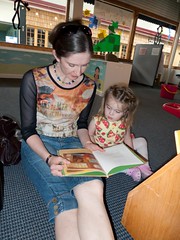The Washington Post recently ran a column written by Middlebury sociologist Margaret K. Nelson. Nelson reports on potential implications of “helicopter parenting” (the constantly hovering style of super-involved middle class parents) in the lives of the parents themselves, especially mothers.
recently ran a column written by Middlebury sociologist Margaret K. Nelson. Nelson reports on potential implications of “helicopter parenting” (the constantly hovering style of super-involved middle class parents) in the lives of the parents themselves, especially mothers.
Helicopter parenting is, to put it mildly, more time-consuming and more emotionally demanding than other parenting styles. And much of its work falls (as the work of parenting always has) on women. Since 1965, the amount of time mothers spend on all child-care activities has risen, even though the majority of mothers are now in the labor force; the increase has been particularly sharp among highly educated mothers.
So it’s not just that today’s professional mothers are holding down what would, in the 1960s, have been two separate jobs — one inside the home, the other outside it. It’s that the first of those jobs is a lot more taxing than it used to be. Mothers who try to live up to the new parenting standards of the professional middle class seem to have few options: They can overwork themselves, or they can leave the workforce.
While some mothers do leave the workforce, many do not. Their intense devotion to building a relationship with their kids and working outside the home can be understandably taxing on their other relationships, such as friendships, marriages, and community involvement.
For those helicopter mothers who don’t leave the workplace, personal relationships seem to be the first thing to go. Working a demanding job while paying painstaking attention to one’s children leaves little time for maintaining a marriage…
[A]ccording to sociologists Suzanne Bianchi, John Robinson and Melissa Milkie, adults in 2000 spent less time with their spouses than adults did in 1975, as they spent more time at work and more time with their children. The higher divorce rate among women with high-pressure careers could therefore be both a cause and a consequence of intense devotion to one’s children: These mothers may find that the only reliable, and persistent, relationships are those with their kids.
When people turn inward to their families, their communities also pay a high price. In a series of studies, sociologists Naomi Gerstel, Sally Gallagher and Natalia Sarkisian have shown that, parenting practices notwithstanding, marriage is a greedy institution. Compared with singles, married people are less likely to visit relatives, less likely to take care of elderly parents and less involved with neighbors and friends.
I suspect that the tendency to turn inward must be even more intense among hyper-vigilant parents. And this withdrawal may extend to parents’ broader social and civic engagement…
And to friendship. The time married parents spend visiting with friends and relatives outside the nuclear family has declined dramatically: Married fathers spent almost 40 percent less time and married mothers spent almost a third less time socializing in 2000 than they did in 1965, according to Bianchi, Robinson and Milkie. I can’t help but think that the new intensity of daily life is part of the problem. Parents seem to have few opportunities to pursue friendships unless they are friendships that take little extra time (as with co-workers or other parents on the sideline of a child’s sporting event).
Many of the helicopter mothers I’ve spoken to have told me, often with pride in their voices, that their daughters are their best friends. At first, I wondered why these women — some of them in their late 40s or 50s — wouldn’t prefer to spend their free time with people their own age. But as I looked more closely at the way they are tackling parenthood, I understood: They have no free time.

Comments 1
Helicopters With Nowhere to Land: From Context Crawler by Shannon Golden « Care Work Live — July 30, 2010
[...] post from Context Crawler by Shannon Golden Explore posts in the same categories: [...]